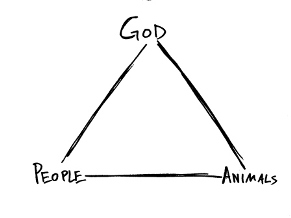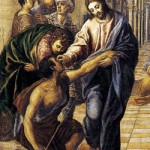 Did the Gentle Beasts Watch in Awe?
Did the Gentle Beasts Watch in Awe?
Daily Advent Reflection.
John Jay Alvaro.
2 Samuel 6:1-11.
Thursday, December 15, 2011
“I,” said the donkey, shaggy and brown
“I carried His mother up hill and down
I carried His mother to Bethlehem town”
“I,” said the donkey, shaggy and brown.
These daily Slow Church Advent Reflections are based on the Daily Readings of the Revised Common Lectionary (Year B). We love for you to read and reflect along with us!
To keep up with this daily Advent series, follow SlowChurch.com on FACEBOOK or TWITTER.
The Old Testament reading for today is this disconcerting story about poor Uzzah, who accidentally touched the ark of God and died. To be more specific, he touched the ark and God killed him. It seems from the story that he was simply trying to catch it from falling because some clumsy oxen tripped. But no matter, God’s anger flared up and consumed him. The whole episode so disturbs King David that he leaves the ark with a servant of Edom rather than taking it to his home city.
There is one set of characters in this scene who get little attention, but are worth a closer look. In the midst of a cast of humans are the oxen who almost dropped the ark. Those beasts must have felt pretty guilty, getting Uzzah killed and all. I bet the oxen went home that night and told their families all about it. Maybe the story of Uzzah and his death went down in oxen history, a legend passed on from stable to stable, until it made its way to a stable in Bethlehem.
Maybe there was an ox in the stable that night of Jesus’ birth. And right there, laid up in his feeding trough was a little baby. And the trough holding the newborn reminded him of a story he heard a long time ago. So the ox leans over to the donkey and asks if he knows the story of Uzzah and the ark of God. The donkey reminds the ox not so subtly that oxen aren’t the only ones with stories about God, and that he had heard about the clumsy oxen who got Uzzah killed. So the ox moves in close and whispers, “You know the part about the ark of God, well I have a weird feeling about that little human in the corner. It is like the ark of God is right over there holding that baby. Like somehow God is in my feeding trough.” The donkey begins to squeal uncontrollably. In between the laughter the donkey gets out one more line, “God, here in this nasty stable with us? You are such an idiot, ox.”
Over in the corner with the baby, two adults huddle close. The man grumbles, “What a noisy bunch of beasts. They are gonna wake up little Jesus.”
Before a discussion of the role of animals in the Old Testament, my professor drew this diagram on the board:
 The idea is that God communicates with both humanity and nature, sometimes independently, sometimes through the other. Both humans and animals have access to God in a unique way. This is evidenced throughout Scripture, be it Balaam’s donkey or the ravens who feed Elijah.
The idea is that God communicates with both humanity and nature, sometimes independently, sometimes through the other. Both humans and animals have access to God in a unique way. This is evidenced throughout Scripture, be it Balaam’s donkey or the ravens who feed Elijah.
The first ones to offer hospitality to Jesus are a bunch of animals in a stable, because the humans did not make room in the house. “The Friendly Beasts” is a silly Christmas song, at one time associated with the Feast of Fools. It captures the absurdity of God’s grand entrance into the world, slipping into a stable surrounded by animals. Did those gentle beasts know what they were witnessing on that night? Did they watch in awe?
I have been watching the birds this Advent season. Every night hundreds of them gather on power lines and in trees as we all rush around in a holiday panic. What do these birds think of our restless hurry?
Considering the birds may not be a bad idea this Advent season. While we are at it, consider the oxen, the donkeys, the turtles, the cats and dogs and gold fish. Jesus was not just born for us. This is their Christmas too.












